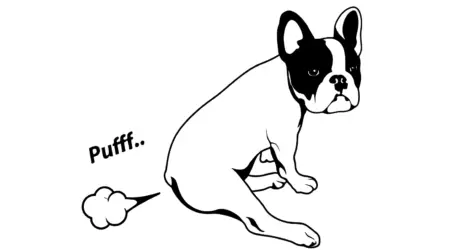Why Is My French Bulldog So Hyper? Helps & Guide
Introduction:
Meet your delightful French Bulldog, a bundle of energy and affection. While these charming companions are known for their lovable nature, you might find yourself wondering, “Why is my French Bulldog so hyper?” We’ll examine the elements influencing their energetic behavior in this blog post, providing insights into their special traits and useful advice for keeping a contented and balanced furry pet.
Whether you’re a new Frenchie parent or seeking ways to better understand your lively companion, this guide will shed light on the reasons behind your French Bulldog’s exuberance.
French Bulldog Characteristics
Compact Size and Sturdy Build:
- French Bulldogs are small, muscular dogs with a distinctive compact build.
- Their sturdy frame makes them resilient and well-suited for urban living.
Distinctive Bat-Ears:
- One of the defining features of Frenchies is their bat-like ears that stand erect.
- These ears contribute to their expressive and endearing facial appearance.
Short Coat and Various Colors:
- French Bulldogs have a smooth, short coat that requires minimal grooming.
- They come in a variety of colors, including brindle, fawn, cream, and pied.
Friendly and Sociable Nature:
- Known for their friendly disposition, French Bulldogs are social animals that thrive on companionship.
- They often form strong bonds with their owners and enjoy interacting with people.
Playful and Energetic:
- Despite their small size, Frenchies are surprisingly energetic and playful.
- They love engaging in games and activities, making them lively and entertaining pets.
Adorable Wrinkled Face:
- French Bulldogs sport a charming, wrinkled face that adds to their irresistible appeal.
- The wrinkles, especially around the nose and forehead, give them a unique and cute look.
Affectionate and Loyal:
- French Bulldogs are known for their loyalty and affection towards their family.
- They seek attention and enjoy being involved in family activities.
Moderate Exercise Needs:
- While energetic, Frenchies don’t have extremely high exercise requirements.
- Enough playtime and walks each day will keep them content and healthy.

Factors Contributing to Hyperactivity
Lack of Physical Exercise:
- French Bulldogs are naturally energetic, and insufficient exercise can lead to excess energy.
- Regular walks, play sessions, and activities are crucial to burn off their energy.
Insufficient Mental Stimulation:
- These intelligent dogs need mental challenges to stay engaged.
- Lack of mental stimulation may result in restlessness and hyperactive behavior.
Poor Diet and Nutrition:
- Nutrition plays a role in a dog’s overall well-being, affecting behavior.
- Inadequate or inappropriate diet might contribute to hyperactivity.
Health Issues:
- Underlying health problems, such as allergies, dental issues, or thyroid imbalances, can cause discomfort and restlessness.
Lack of Training and Structure:
- French Bulldogs benefit from consistent training and a structured routine.
- Absence of clear boundaries may lead to hyperactive tendencies.
Health Considerations
Allergies or Sensitivities:
- French Bulldogs may be prone to allergies, often manifesting through skin issues or digestive problems.
- Identifying and managing potential allergens in their diet can alleviate discomfort.
Dental Problems:
- Due to their brachycephalic (short-nosed) structure, Frenchies may experience dental issues.
- Regular dental care, including brushing and appropriate chew toys, helps maintain oral health.
Thyroid Issues:
- Thyroid imbalances can affect a French Bulldog’s metabolism and energy levels.
- Routine veterinary check-ups can detect and address thyroid-related concerns.
Weight Management:
- French Bulldogs can be prone to obesity, which may exacerbate health issues.
- Monitoring their diet and providing regular exercise helps maintain a healthy weight.
Respiratory Health:
- Brachycephalic breeds may experience respiratory challenges.
- Avoiding strenuous exercise in extreme weather conditions and maintaining a cool environment is beneficial.
Regular Veterinary Check-ups:
- Routine vet visits are essential for preventive care and early detection of health issues.
- Vaccinations, parasite control, and overall health assessments contribute to a happy and healthy Frenchie.
Training and Behavioral Techniques
Basic Obedience Training:
- Teach fundamental commands like sit, stay, and come using positive reinforcement.
- Consistent training builds a strong foundation for good behavior.
Positive Reinforcement:
- Reward desirable behavior with treats, praise, or playtime.
- This encourages your French Bulldog to associate positive actions with enjoyable outcomes.
Socialization:
- Introduce your Frenchie to various environments, people, and other animals from a young age.
- Socialization enhances their adaptability and reduces anxiety in different situations.
Interactive Toys and Games:
- Stimulate your French Bulldog’s mind with interactive toys and puzzle games.
- Mental stimulation is as important as physical exercise in preventing boredom.
Ignore Unwanted Behavior:
- Ignore or redirect negative behavior instead of punishing.
- Withholding attention for undesirable actions helps discourage them.
Crate Training:
- Introduce a crate as a safe and comfortable space.
- Crate training aids in housebreaking and provides a secure retreat for your Frenchie.
Leash Training:
- Teach your French Bulldog not to pull when walking on a leash.
- Consistent leash training ensures enjoyable and controlled walks.
Environmental Factors
Comfortable Living Space:
- Provide your Frenchie a comfortable and safe space.
- Ensure they have a comfortable bed and a designated spot where they feel safe.
Minimizing Noise and Stressors:
- French Bulldogs may be sensitive to loud noises and certain stimuli.
- Minimize stressors like loud music or abrupt sounds to create a calm atmosphere.
Temperature Control:
- Brachycephalic breeds like French Bulldogs may struggle with heat.
- Maintain a cool environment, especially during hot weather, to prevent discomfort.
Safe Outdoor Area:
- Create a safe and enclosed outdoor space for play and exploration.
- A secure environment allows them to enjoy outdoor activities without risks.
Introduce New Elements Gradually:
- When making changes to your home or introducing new objects, do so gradually.
- Sudden changes can cause stress and anxiety in sensitive Frenchies.
Attention and Affection:
- Provide regular affection and attention to prevent feelings of loneliness.
- Positive interactions with your Frenchie strengthen the bond and reduce anxiety.
Safe Chew Toys:
- Offer appropriate chew toys to satisfy their natural instinct to chew.
- This helps prevent destructive behavior and keeps them mentally engaged.
Limit Exposure to Harmful Substances:
- French Bulldogs may be prone to allergies.
- Be cautious of potential allergens, including certain plants, foods, or cleaning products.
Also Read: French Bulldog Temperature Tolerance: Helps & Guide
Conclusion
In conclusion, understanding and addressing the factors influencing your French Bulldog’s behavior is essential for fostering a happy and well-behaved companion. From providing proper exercise and mental stimulation to addressing potential health issues, a holistic approach contributes to a balanced Frenchie. Consistent training, a supportive living environment, and regular veterinary care all play pivotal roles.
By embracing positive reinforcement, creating a comfortable space, and being attuned to their unique needs, you’ll nurture a strong bond and ensure that your French Bulldog thrives both physically and emotionally. With patience, love, and thoughtful care, you can enjoy the delightful companionship of your energetic and affectionate Frenchie.












Leave a Reply